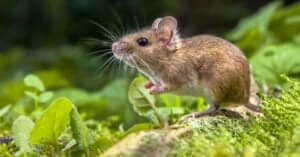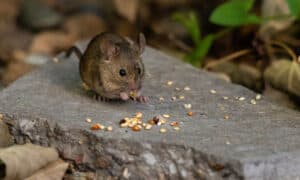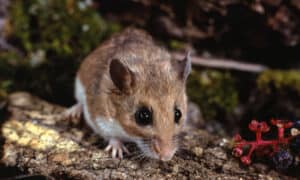Your guinea pig’s water bottle or bowl should always be filled with fresh, clean water. Guinea pigs can die from going without water for less than 24 hours, especially if they’re also without food.
In this article, we’ll discuss the importance of water for guinea pigs, how long they can go without water, and what to do if your guinea pig isn’t drinking.
How Often do Guinea Pigs Need Water?
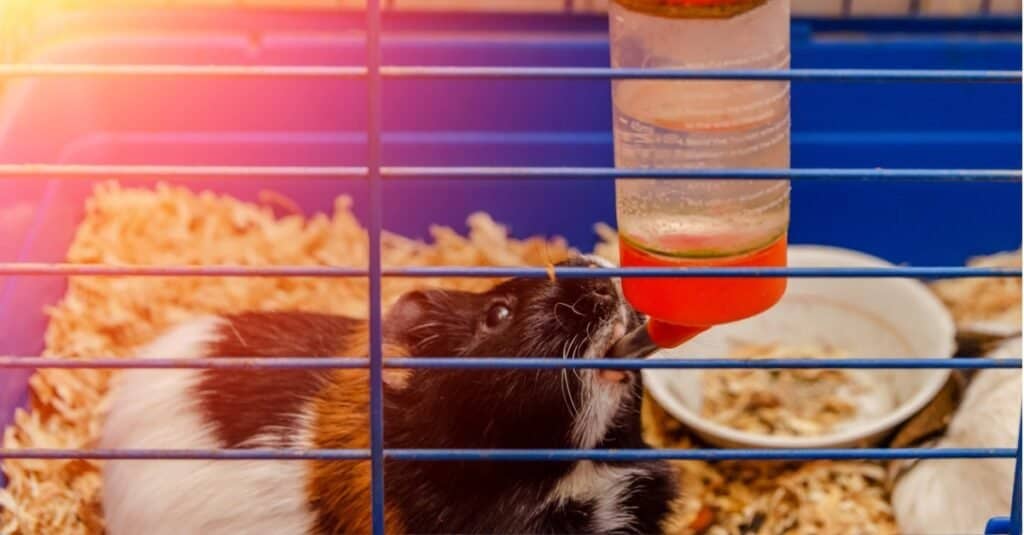
Never take water away from your guinea pig, as they need constant access to it.
©iStock.com/Yaraslau Mikheyeu
Guinea pigs should never be without water. The only exceptions are short excursions for floor time or vet visits from their cage. Piggies also need constant access to fresh hay, even during these trips out of the cage.
Each guinea pig should have their own water bottle or bowl, but it never hurts to have an extra in case something goes wrong! If you only have one water source and it empties, or the water bottle stops working, your piggies won’t have anything to drink.
You’ll also want to ensure the water sources are secure and functioning properly. Bowls should be heavy so they can’t be tipped over, and bottles should have secure lids and spouts. Check water bottle spouts regularly to ensure that they aren’t blocked.
If you’re traveling with your guinea pig for several hours and don’t want to hook a water bottle to their carrier, providing watery vegetables such as cucumber can help keep them hydrated.
If you’re going on vacation without your guinea pigs, someone should stop by at least once a day to check their water bottles, replenish their hay, and feed them fresh vegetables.
How Long Does a Guinea Pig Take to Become Dehydrated?
A healthy guinea pig may be able to survive up to 24-48 hours without water. However, they can become dehydrated much sooner than this and may suffer from severe health problems as a result. Your guinea pigs should absolutely never go this long without water.
Dehydrated Guinea Pig Health Problems
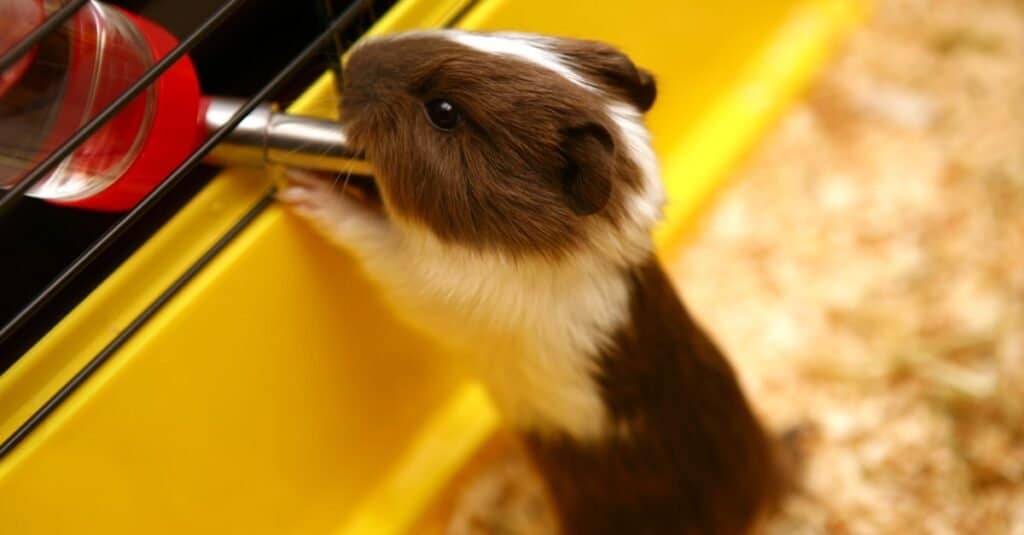
When a guinea pig is dehydrated, they’re more likely to develop health issues such as urinary problems.
©Gordana Sermek/Shutterstock.com
GI Stasis
If the guinea pig also doesn’t have food, they’ll likely go into GI Stasis long before the 24-hour mark. GI Stasis is a deadly condition in which the digestive system stops working to move food through the body.
Gi Stasis typically sets in after around 6-8 hours without food, and it can happen sooner in piggies who also don’t have water access.
Remember that guinea pigs’ digestive systems move very quickly and need constant nourishment.
Kidney Damage
The kidneys need water in order to function properly. If your guinea pig goes too long without water, they may suffer from kidney damage.
Kidney damage is irreparable and, when severe, can cause a guinea pig to have kidney disease for the rest of their lives.
Complete kidney failure is another possible consequence of allowing your guinea pig to become dehydrated.
Bladder Stones
Bladder stones are more likely to occur when a guinea pig isn’t drinking enough water. If your guinea pig develops a bladder stone, it can form a blockage that makes them unable to pee. This is a painful and life-threatening condition that requires emergency vet treatment.
Urinary Tract Infection (UTI)
Without enough water to flush out the urinary tract, your guinea pig may develop a urinary tract infection or UTI. Your veterinarian will need to prescribe antibiotics to treat the infection.
Heatstroke
Dehydration on its own won’t cause heat stroke, but going without water in hot temperatures increases your guinea pig’s risk.
In the summer months, you may want to refresh your guinea pigs’ water more often or provide more watery vegetables to ensure they stay hydrated.
How Can You Tell if a Guinea Pig is Dehydrated?
Here are some ways to know if your guinea pig is dehydrated:
- Monitor their potty habits: Dehydrated guinea pigs won’t urinate as frequently, and their urine will be darker in color with a strong odor. Their stools will be hard, dry, and teardrop-shaped.
- Are they eating? Often a dehydrated guinea pig also won’t eat normally. This is a sign that they need an emergency vet appointment.
- Do they have eye or mouth discharge? Thick drool and crusty eyes are two signs of dehydration in guinea pigs.
- Gently pinch the skin. Your piggy is likely dehydrated if it feels loose and doesn’t snap back into place.
What to do if Your Guinea Pig isn’t Drinking
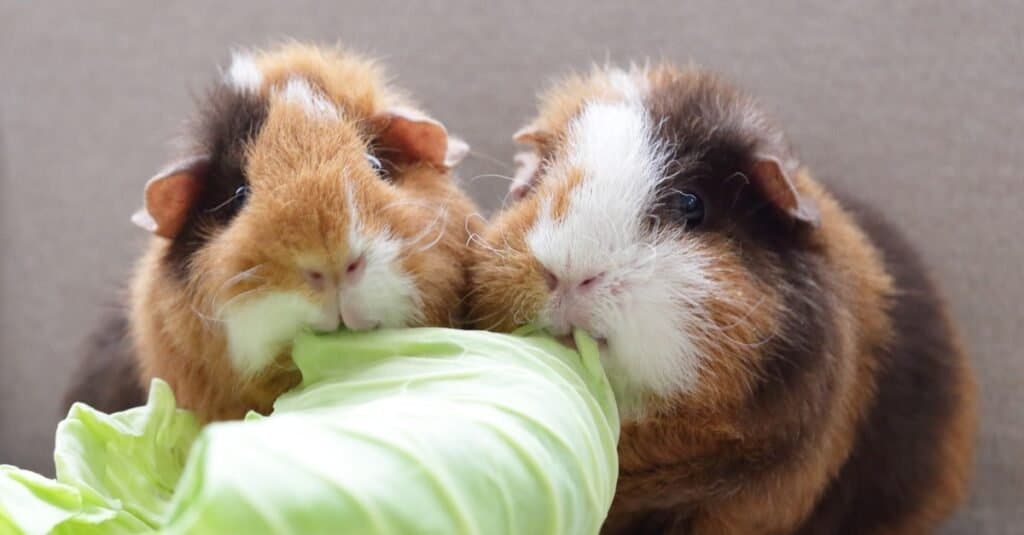
Guinea pigs get some hydration from their daily vegetables.
©yurilily/Shutterstock.com
#1: Determine the Cause
If your guinea pig stops drinking suddenly and without reason, they need to see a veterinarian quickly. The same applies if they’re drinking either more or less than usual.
First, though, you might want to rule out the following causes:
- Many guinea pigs drink more in the summer and less in the winter.
- If you feed many watery vegetables, your guinea pigs may not be thirsty enough to drink or may drink very little.
- It’s normal for new guinea pigs to hide a lot, and they might wait to drink until you’re not around. Alternatively, they may not drink unless they can reach the water bottle from their hide.
If nothing has changed in your guinea pig’s environment or diet, they may have an illness that needs to be addressed. Remember that illnesses in guinea pigs can progress very quickly, and they can’t go long without water or food–so the situation should be treated as an emergency.
#2: Move the Water Closer to Your Guinea Pig
If your new guinea pig is staying beneath their hide, moving the water bottle within reach can help them feel safe enough to drink. They may not wander out, especially while you’re nearby.
Guinea pigs are prey animals, and adjusting to new surroundings often takes a while. Eventually, they’ll feel comfortable being out in the open, but that takes time.
#3: Feed them Watery Vegetables
If your guinea pig isn’t drinking like normal, you might want to provide extra watery veggies, such as romaine lettuce or cucumber, or leave their daily vegetables damp after washing them. This helps get some hydration into them while you figure out a more permanent solution.
#4: Try a Water Bottle or Bowl
New guinea pigs may be used to either a bottle or bowl and become confused if water is presented the other way.
Most guinea pigs drink more from bottles than bowls, but it’s worth trying whichever isn’t currently in their cage to discover their unique preferences.
#5: Ensure the Water is Clean and Fresh
If it’s been a while since you last cleaned their water bottle or bowl, this might have caused your guinea pigs to stop drinking from it. Dirty water bottles and bowls can grow algae or even mold, and they can also harbor bacteria that isn’t healthy for your piggies.
Both bottles and bowls should be emptied and refilled at least once daily and deep cleaned at least once a week. Bowls may need more frequent cleaning if your piggies are messy, which most are!
When cleaning water bottles, make sure to use a bottle brush on the inside of the bottle and to clean the entire interior of the spout as well.
#6: Check that the Water Bottle is Working
Sometimes debris can get caught in the spout, blocking water from coming out when your guinea pigs try to drink. Tap your finger against the spout to ensure it’s releasing water.
If it isn’t, you may need to clean the spout or purchase a new water bottle. In the meantime, use another bottle or give your guinea pigs a bowl of water.
I hope this article has helped you to learn more about guinea pig care. Remember that fresh water and hay at all times is a must!
If your guinea pig isn’t drinking, don’t panic–but do search for the root cause and bring them to the veterinarian if necessary.
Thank you for reading! If you have feedback on this post, please contact the AZ Animals editorial team.
The photo featured at the top of this post is © Gordana Sermek/Shutterstock.com
Thank you for reading! Have some feedback for us? Contact the AZ Animals editorial team.




